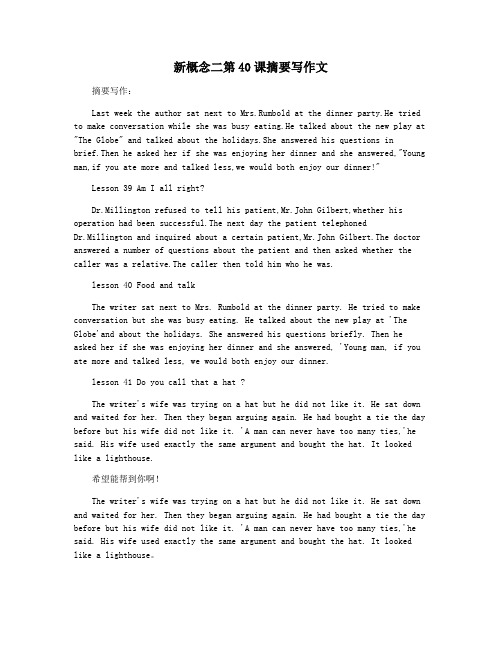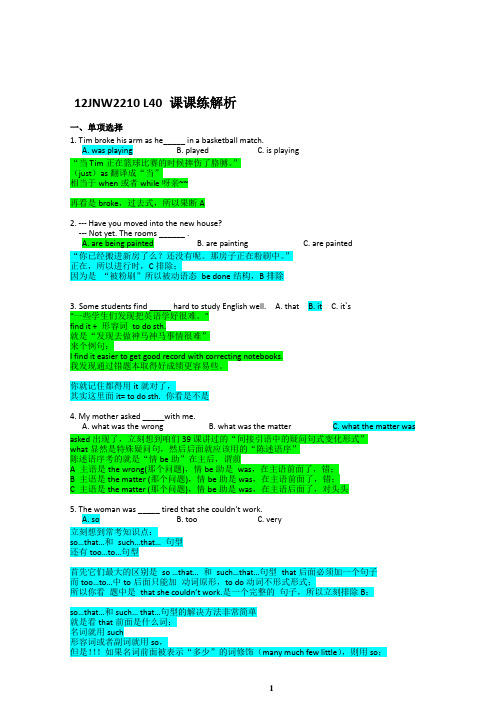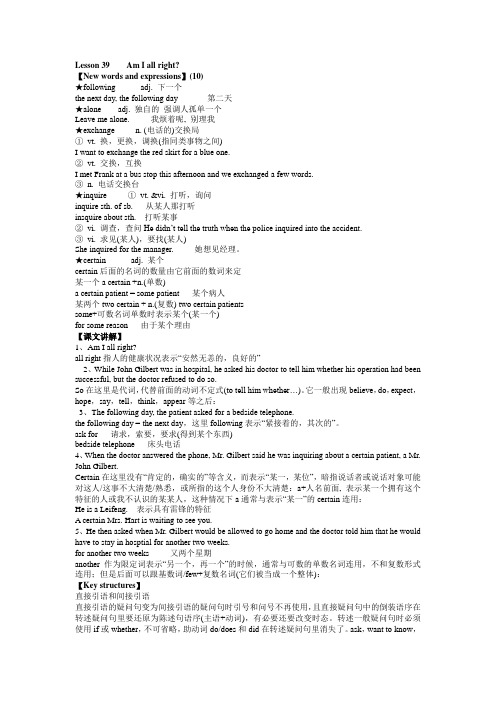新概念第二册第39-40课
- 格式:pdf
- 大小:510.86 KB
- 文档页数:12

新概念二第40课摘要写作文摘要写作:Last week the author sat next to Mrs.Rumbold at the dinner party.He tried to make conversation while she was busy eating.He talked about the new play at "The Globe" and talked about the holidays.She answered his questions inbrief.Then he asked her if she was enjoying her dinner and she answered,"Young man,if you ate more and talked less,we would both enjoy our dinner!"Lesson 39 Am I all right?lington refused to tell his patient,Mr.John Gilbert,whether his operation had been successful.The next day the patient telephonedlington and inquired about a certain patient,Mr.John Gilbert.The doctor answered a number of questions about the patient and then asked whether the caller was a relative.The caller then told him who he was.lesson 40 Food and talkThe writer sat next to Mrs. Rumbold at the dinner party. He tried to make conversation but she was busy eating. He talked about the new play at 'The Globe'and about the holidays. She answered his questions briefly. Then he asked her if she was enjoying her dinner and she answered, 'Young man, if you ate more and talked less, we would both enjoy our dinner.lesson 41 Do you call that a hat ?The writer's wife was trying on a hat but he did not like it. He sat down and waited for her. Then they began arguing again. He had bought a tie the day before but his wife did not like it. 'A man can never have too many ties,'he said. His wife used exactly the same argument and bought the hat. It looked like a lighthouse.希望能帮到你啊!The writer's wife was trying on a hat but he did not like it. He sat down and waited for her. Then they began arguing again. He had bought a tie the day before but his wife did not like it. 'A man can never have too many ties,'he said. His wife used exactly the same argument and bought the hat. It looked like a lighthouse。

12JNW2210 L40 课课练解析一、单项选择1. Tim broke his arm as he_____ in a basketball match.A. was playingB. playedC. is playing“当Tim正在篮球比赛的时候摔伤了胳膊。
”(just)as翻译成“当”相当于when或者while呀亲~~再看是broke,过去式,所以果断A2. --- Have you moved into the new house?--- Not yet. The rooms ______ .A. are being paintedB. are paintingC. are painted“你已经搬进新房了么?还没有呢。
那房子正在粉刷中。
”正在,所以进行时,C排除;因为是“被粉刷”所以被动语态be done结构,B排除3.Some students find _____ hard to study English well. A. that B. it C. it`s“一些学生们发现把英语学好很难。
”find it + 形容词to do sth.就是“发现去做神马神马事情很难”来个例句:I find it easier to get good record with correcting notebooks.我发现通过错题本取得好成绩更容易些。
你就记住都得用it就对了,其实这里面it= to do sth. 你看是不是4. My mother asked _____with me.A. what was the wrongB. what was the matterC. what the matter was asked出现了,立刻想到咱们39课讲过的“间接引语中的疑问句式变化形式”what显然是特殊疑问句,然后后面就应该用的“陈述语序”陈述语序考的就是“情be助”在主后,谓前A 主语是the wrong(那个问题),情be助是was,在主语前面了,错;B 主语是the matter (那个问题),情be助是was,在主语前面了,错;C 主语是the matter (那个问题),情be助是was,在主语后面了,对头头5. The woman was _____ tired that she c ouldn’t work.A. soB. tooC. very立刻想到常考知识点:so…that…和such…that…句型还有too…to…句型首先它们最大的区别是so …that…和such…that…句型that后面必须加一个句子而too…to…中to后面只能加动词原形,to do动词不形式形式;所以你看题中是that she couldn’t work.是一个完整的句子,所以立刻排除B;so…that…和such… that…句型的解决方法非常简单就是看that前面是什么词:名词就用such形容词或者副词就用so,但是!!!如果名词前面被表示“多少”的词修饰(many much few little),则用so;1所以that前面是tired是形容词,立刻只能选so6. The house _____ my family most money. A. costs B. spends C. pays关于花费钱的句型,物作主语,就只能用一个词儿----cost7. Jerry’s mother is very angry with him because he told a ______.A. lieB. layC. lain前面be angry with sb. 对某人感到生气为啥要生气呢?因为他撒谎了,撒谎的名词就是lie撒谎就是tell a lie讲故事tell a story除了这个名词你得知道外,请你必须记住以下常考内容:lie 作为动词“撒谎”-----过去式(lied)-----过去分词(lied)lie作为动词“躺下、坐落”----过去式(lay“累”)----过分(lain)lay作为动词“下蛋”----过去式(laid“累的”)-----过分(laid“还是很累的”)另外lie的现在分词是lying必须都会哈~~8. If I ______ Joe, I would hire an assistant now. A. am B. was C. were看见if立刻想到“主将从现”你看后面竟然出现了would这种东西,说明不是“主将从现”那就是咱们38课学习的“虚拟语气”看笔记哈~~9. If I were you, I ______ so confident to finish the task.A. will not beB. would not beC. cannot be 同上~~10. Jimmy ______ great progress in English, because he studied hard recently.A. madeB. gotC. took请看39课第3题11. Every student in the class ______ their eyes on the new student.A. gotB. madeC. fixed看笔记呦13. If there _____no electricity, human life_____ quite different today.A. is; would bB. were; would beC. were; will be同8electricity 电14. If you _____that late movie last night, you wouldn’t be so sleepy.A. ha ven’t watchedB. hadn’t watchedC. didn’t watch同815. By the end of tomorrow he will _____the job.A. finishB. have finishedC. has finished请看39课文17. The soldier fixed his eyes_____ the target. A. for B. on C. with请看笔记和11题呦18. Most people _____him _____a fool.A. regarded; asB. regarded; likeC. looked; likeregard sb./sth. as…把…当成看成…“大部分的人都把他当砂纸。

新概念英语第二册Lesson36~40课文注释新概念英语作为家喻户晓的经典之作,它有着全新的教学理念,下面我就和大家共享新概念英语第二册Lesson36~40课文解释,希望有了这些内容的关怀,可以为大家学习新概念英语提供关怀!新概念英语第二册Lesson36课文解释1.…she hopes to set up a new world record.……她希望创一项新的世界纪录。
set up 是个固定短语,它的含义之一为“创立”、“建立”,可以指某个具体的事物,如set up a school(创建一所学校),也可以指抽象的,如某个机构、组织等。
a world record 常用于指体育方面的世界纪录。
2.…many people fee that she is sure to succeed.……很多人认为她确定能胜利。
(1) feel在此处为及物动词,表示“认为”、“信任”等:Tom feels that he can pass the examination.汤姆认为他能通过这次考试。
My parents feel that they can believe in you.我父母认为他们可以信任你。
(2) sure在这里表示“确定会”、“必定会”,后面通常跟带to的不定式:Billy is sure to win the race.比利确定会赢得这场竞赛。
If you dont work hard, you are sure to fail in the next exam.你假如不用功学习,下次考试确定会不及格。
3.Tomorrow he will be watching her anxiously as she swims the long distance to England. 明天他将焦急地注视着女儿游过这段漫长的距离到达英国。
这句话中主句的时态为将来进行时(cf.第13课语法),时间状语从句表示的虽然也是将来的动作,但用的是一般如今时,再如:Ill be meeting her at the station when she arrives tomorrow.她明天到达时我将在车站接她。


《新概念英语》第二册第1课:新概念英语第二册(美音版)A private conversation 私人谈话(精讲)第2课:新概念英语第二册(美音版)Breakfast or lunch? 早餐还是午餐?(精讲)第3课:新概念英语第二册(美音版)Please send me a card 请给我寄张明信片(精讲)第4课:新概念英语第二册(美音版)An exciting trip 激动人心的旅行(精讲)第5课:新概念英语第二册(美音版)No wrong numbers 无错号之虞(精讲)第6课:新概念英语第二册(美音版)Percy Buttons 珀西.巴顿斯(精讲)第7课:新概念英语第二册(美音版)Too late 为时太晚(精讲)第8课:新概念英语第二册(美音版)The best and the worst 最好的和最差的(精讲)第9课:新概念英语第二册(美音版)A cold welcome 冷遇(精讲)第10课:新概念英语第二册(美音版)Not for jazz 不适于演奏爵士乐(精讲)第11课:新概念英语第二册(美音版)One good turn deserves another 礼尚往来(精讲)第12课:新概念英语第二册(美音版)Goodbye and good luck 再见, 一路顺风(精讲)第13课:新概念英语第二册(美音版)The Greenwood Boys 绿林少年(精讲)第14课:新概念英语第二册(美音版)Do you speak English?你会讲英语吗?(精讲)第15课:新概念英语第二册(美音版)Good news 佳音(精讲)第16课:新概念英语第二册(美音版)A polite request 彬彬有礼的要求(精讲)第17课:新概念英语第二册(美音版)Always young 青春常驻(精讲)第18课:新概念英语第二册(美音版)He often does this! 他经常干这种事!(精讲)第19课:新概念英语第二册(美音版)Sold out 票已售完(精讲)第20课:新概念英语第二册(美音版)One man in a boat 独坐孤舟(精讲)第21课:新概念英语第二册(美音版)Mad or not?是不是疯了(精讲)第22课:新概念英语第二册(美音版)A glass envelope 玻璃信封(精讲)第23课:新概念英语第二册(美音版)A new house 新居(精讲)第24课:新概念英语第二册(美音版)If could be worse 不幸中之万幸(精讲)第25课:新概念英语第二册(美音版)Do the English speak English?英国人讲的是英语吗?(精讲)第26课:新概念英语第二册(美音版)The best art critics最佳艺术评论家(精讲)第27课:新概念英语第二册(美音版)A wet night 雨夜(精讲)第28课:新概念英语第二册(美音版)No parking 禁止停车(精讲)第29课:新概念英语第二册(美音版)Taxi! 出租汽车(精讲)第30课:新概念英语第二册(美音版)Football or polo? 足球还是水球?(精讲)第31课:新概念英语第二册(美音版)Success story 成功者的故事(精讲)第32课:新概念英语第二册(美音版)Shopping made easy 购物变得很方便(精讲)第33课:新概念英语第二册(美音版)Out of the darkness 冲出黑暗(精讲)第34课:新概念英语第二册(美音版)Quick work 破案 “神速”(精讲)第35课:新概念英语第二册(美音版)Stop thief!捉贼!(精讲)第36课:新概念英语第二册(美音版)Across the Channel 横渡海峡(精讲)第37课:新概念英语第二册(美音版)The Olympic Games 奥林匹克运动会(精讲)第38课:新概念英语第二册(美音版)Everything except the weather 唯独没有考虑到天气(精讲第39课:新概念英语第二册(美音版)Am I all right? 我是否痊愈?(精讲)第40课:新概念英语第二册(美音版)Food and talk 进餐与交谈(精讲)第41课:新概念英语第二册(美音版)Do you call that a hat? 你把那个叫帽子吗?(精讲)第42课:新概念英语第二册(美音版)Not very musical 并非很懂音乐(精讲)第43课:新概念英语第二册(美音版)Over the South Pole 飞越南极(精讲)第44课:新概念英语第二册(美音版)Through the forest 穿过森林(精讲)第45课:新概念英语第二册(美音版)A clear conscience 问心无愧(精讲)第46课:新概念英语第二册(美音版)Expensive and uncomfortable 既昂贵又受罪(精讲)第47课:新概念英语第二册(美音版)A thirsty ghost 嗜酒的鬼魂(精讲)第48课:新概念英语第二册(美音版)Did you want to tell me something? 你想对我说什么吗?第49课:新概念英语第二册(美音版)The end of a dream 美梦告终(精讲)第50课:新概念英语第二册(美音版)Taken for a ride 乘车兜风(精讲)第51课:新概念英语第二册(美音版)Reward for virtue 对美德的奖赏(精讲)第52课:新概念英语第二册(美音版)A pretty carpet 漂亮的地毯(精讲)第53课:新概念英语第二册(美音版)Hot snake 触电的蛇(精讲)第54课:新概念英语第二册(美音版)Sticky fingers 粘糊的手指(精讲)第55课:新概念英语第二册(美音版)Not a gold mine 并非金矿(精讲)第56课:新概念英语第二册(美音版)Faster than sound! 比声音还快!(讲解)第57课:新概念英语第二册(美音版)Can I help you, madam? 您要买什么,夫人?(精讲)第58课:新概念英语第二册(美音版)A blessing in disguise? 是因祸得福吗?(精讲)第59课:新概念英语第二册(美音版)In or out? 进来还是出去?(精讲)第60课:新概念英语第二册(美音版)The future 卜算未来(精讲)第61课:新概念英语第二册(美音版)Trouble with the Hubble 哈勃望远镜的困境(讲解)第62课:新概念英语第二册(美音版)After the fire 大火之后(精讲)第63课:新概念英语第二册(美音版)She was not amused 她并不觉得好笑(精讲)第64课:新概念英语第二册(美音版)The Channel Tunnel 海峡隧道(精讲)第65课:新概念英语第二册(美音版)Jumbo versus the police 小象对警察(精讲)第66课:新概念英语第二册(美音版)Sweet as honey! 像蜜一样甜!(精讲)第67课:新概念英语第二册(美音版)Volcanoes 火山(精讲)第68课:新概念英语第二册(美音版)Persistent 纠缠不休(精讲)第69课:新概念英语第二册(美音版)But not murder!并非谋杀!(精讲)第70课:新概念英语第二册(美音版)Red for danger 危险的红色(精讲)第71课:新概念英语第二册(美音版)A famous clock第72课:新概念英语第二册(美音版)A car called bluebird第73课:新概念英语第二册(美音版)The record-holder第74课:新概念英语第二册(美音版)Out of the limelight第75课:新概念英语第二册(美音版)SOS第76课:新概念英语第二册(美音版)April Fools Day第77课:新概念英语第二册(美音版)A successful operation第78课:新概念英语第二册(美音版)The last one?第79课:新概念英语第二册(美音版)By air第80课:新概念英语第二册(美音版)The Crystal Palace第81课:新概念英语第二册(美音版)Escape第82课:新概念英语第二册(美音版)Monster or fish?第83课:新概念英语第二册(美音版)After the elections第84课:新概念英语第二册(美音版)On strike第85课:新概念英语第二册(美音版)Never too old to learn第86课:新概念英语第二册(美音版)Out of control第87课:新概念英语第二册(美音版)A perfect alibi第88课:新概念英语第二册(美音版)Trapped in a mine第89课:新概念英语第二册(美音版)A slip of the tongue 第90课:新概念英语第二册(美音版)What第91课:新概念英语第二册(美音版)Three men in a basket 第92课:新概念英语第二册(美音版)Asking for trouble第93课:新概念英语第二册(美音版)A noble gift第94课:新概念英语第二册(美音版)Future champions第95课:新概念英语第二册(美音版)A fantasy第96课:新概念英语第二册(美音版)The dead return。

Lesson 39 Am I all right?【New words and expressions】(10)★following adj. 下一个the next day, the following day 第二天★alone adj. 独自的强调人孤单一个Leave me alone. 我烦着呢, 别理我★exchange n. (电话的)交换局①vt. 换,更换,调换(指同类事物之间)I want to exchange the red skirt for a blue one.②vt. 交换,互换I met Frank at a bus stop this afternoon and we exchanged a few words.③n. 电话交换台★inquire ①vt. &vi. 打听,询问inquire sth. of sb. 从某人那打听insquire about sth. 打听某事②vi. 调查,查问He didn’t tell the truth when the po lice inquired into the accident.③vi. 求见(某人),要找(某人)She inquired for the manager. 她想见经理。
★certain adj. 某个certain后面的名词的数量由它前面的数词来定某一个a certain +n.(单数)a certain patient = some patient 某个病人某两个two certain + n.(复数) two certain patientssome+可数名词单数时表示某个(某一个)for some reason 由于某个理由【课文讲解】1、Am I all right?all right指人的健康状况表示“安然无恙的,良好的”2、While John Gilbert was in hospital, he asked his doctor to tell him whether his operation had been successful, but the doctor refused to do so.So在这里是代词,代替前面的动词不定式(to tell him whether…)。
L 39第二天the next day,the following day第二个星期the next week,the following weekalone 强调人孤单一个home alone独自在家leave me alone我烦着呢,别理我inquire sth of sb 从某人那打听insquire about sthsome+可数名词单数时表示某个certain 后面的东西不能定a certain boytwo certain boyscertain根据它前面的数量来定某一个a certain+n某两个two certain +n(复数)for some reason由于某个理由1、certain 前加数字表某几个2、following取代next3、alone表示单独的,客观事实上的a+人名前面,表示某一个拥有这个特征的人multiple choice questions7、a、has done 已经做的b、must do必须做的c、must be doingmust 后面+原形,+be doing,+have done属于推测句型的三种结构must+v(原形):1、=have to 不得不2、很可能,对现在或者将来的推测must be doing对说话的当时的正在进行的行为的推测must have done对过去的事情的推测must have been doing对过去的正在进行的动作的推测11、on one's own =aloneof one's own 某人自己的12、knowledge学问information信息,不可数名词message可数名词3、take sb to hospital送某人去医院5、for what 因为...在疑问句中=whyL 40host 男主人host(v.)作为主人,主办the shoes are shall/tight(夹角)tight jeans紧身牛仔裤fix(没有凝视的概念)fix one's eyes on sth盯着...,目不转睛习惯用被动,表达为one's eyes be fixed on sthall the eyes were fixed on the blackboardglobe球状物,如地球仪global:全球的disappoint失望in despair绝望的sb./sth. is a despair of...the boy is a despair of his parents那男孩的父母对他感到绝望了the examination was a despair of me我对考试已经绝望了ask sb to do sth祈使句next to:与......相邻sit next to me 座我旁边the film will be on那部电影即将要上映用虚拟语气:1、与现在事实相反,从句使用一般过去时,主句使用would+动词原形if you ate more and talked less,we would both enjoy our dinnerif it rained,it would not be hot如果下雨,就不会这么热if you help me,i will be grateful如果你帮我,我会感激你if you helped me,i would be grateful如果你帮了我,我会感激你key structuresspecial difficultiesmake progress取得进步do business做生意do one's bestmake the bed 铺床do some shoppingmake a speechmake ... mistakemake up one's minddo one's homeworkdo ... a favourdo ... jobdo ... workdo exercisemake ... promisemake conversationcomposition1、she not only resused to answer question butshe did not ask any question eitherbut...as well 可以加肯定也可以加否定but...either只能加否定multiple choices5、sit downseat一定要加宾语,如果后面没宾语,后面就用seat的被动语态seat yourself be seatedsit 是主动,没有被动语态,后面不能加宾语9、glance at:扫了一眼stare at:盯着看stuck to:粘在...上面look at,see,watch (看活动的),notice:强调的是眼睛的注意,看一些别人不太注意的事情fix one's eyes on=stare ati glanced at it but i didn't pick it upglimpse of have a glimpse of:瞥了一眼sight catch sight of看见i can catch sight of the birdsbe in sightread:阅读(看)read loudly,read aloud大声朗读,汉语中的读从头来看-look at go through:浏览12、enjoy sth:表示在后者当中得到了一种享受sth amuse/entertain sbenjoy 主语是人enjoy oneself amuse,entertain后面会加人Lesson 391d 2a 3c 4d 5d 6a 7b 8a 9c 10c 11a 12bLesson 401 1.were 2.tries 3.will burn 4.would have to 5.lost6.do not apologize7.were8.won9.would not be 10.could2 1.made...to 2.does...makes 3.doing...making 4.made (i)3 1c 2c 3b 4c 5a 6a 7c 8b 9b 10b 11b 12d。
新概念2第39课练习题答案一、单词短语拒绝是否住院床头电话独自的医院交换台二、回答问题1,what did the doctor refuse to tell his patient?2,Whom did the patient telephone next day? Whom did he inquire about?3,Who was the caller?三、翻译句子。
1,他问他的医生,手术是否成功,但医生拒绝告诉他。
2,第二天病人要了一部床头电话。
3,Gilbert说他正在询问某个病人。
4,他不得不在医院里再呆上两个星期。
5,医生问打电话的人是不是病人的亲属。
四、把下列句子改为间接引语1,'I am very tired' he said.2.,' when will Jack arr^ve?, Tom asked.3.,'Have you ever been abroad?' Tina asked.4,'Why didn' t you write to me?' Jane asked.五、选择1,? A bedside telephone.A For what did he askB What did he askC For what did he ask forD What did he ask for2,I am going shopping now. I home soon.A returnB will be backC come backD go back, Thereis milk in the bottle.A notB anyC fewD no4,She asked meA where did I liveB where did you liveC where IlivedD I lived where5,I think chickens can swim,?A can' t theyB can theyC doesn' t itD do I新概念第二册25-39课练习%1.用careful, clear, quick, sad, slow 的正确副词形式填空1.I can?t always understand his letters. Hedoesn?t write very.2.The woman looked at me and shestarted to cry.3.Please pick up that box. There?s glass inside it.4.I?ve finished my homework in only twenty minutes. I?ve done is much morethan I usually do.5.The workers sometimes work quite so that they can earn more money.%1.从右侧选择出与左侧词组意思相对应的解释1.put awaya. move to a later date2.put downb. stand, tolerate3.put off c.get dressed in, cover body with4.put on d. construct or give someone a bed5.put out e. write down6.put up f. extinguish7.put up with g.put where something is usually kept用上面的词组填一下空格1.Have you ever tried to a tent ina strong wind?2.The firemen managed to the fire ina very short time.3.I think I?ll take off my heavy shoes and my sandals instead.4.Can you our friendsfor one night?5.She won?t the children?srudeness any longer.6.The students are what the teacherhas written on the board.7.The weather was so bad that we had to the football match till next week.8.I have just my booksI can?t get them out again.%1.选词填空1.The shopkeeper to serve the boy.2.If you know you?ve done something wrong, don?t3.Can you my newspaper from the other room?4.I?ll you the book you want when I cometo see you.5.He went to visit her in hospital and hersome flowers.6.Don?t forget to your umbrella with you.It might rain.7.I felt quite ill an hour ago. I?m worse now:I feel ill.8.?I?m ill to go to college today, ?the girl told her mother.%1.必要的地方添加冠词1.While he was in Europe, he visited_________ Italy,Germany,France,UK, and Netherlands.2.Amazon is the longest river in South America.3.Himalays are in Asia.4.Have you ever crossed Pacific orAtlantic?5.She has always wanted to visitUnited Kingdom and see Londonfrom a boat on Thames.2.The factory 500 people when my fatherworked there.3.He?s lucky. He?s just got a new at abank.4.Whenever I throw a stick for my dog, he will run and it.5.When he, my father had worked in the same firm for thirty years.6.?Don?t pay to have your watch mended, ? my friend said, ?I can it for you. ?7.You could a lot of money by using less electricity.8.When you come to see me, please yourcalculator with you.9.The little boy fell into the river and a young man dived in and him.10.on the new bridge has already begun. 六.介词选择1.Please don?t throw stones this notice.A. toB. onC. atD. in2.Everybody ran the building as the firespread.A.outB.out fromC.outsideD. out of3.The car came me very fast.A. toB. towardsC. atD. on4.The rabbit ran that hole and hasn?tcome out yet.A.toB. throughC. intoD.across5.Mr. Jackson flew New York on Friday.A. onB. forC. atD. to6.They are leaving France today.A. toB. forC. onD. at7.They flew London to New York on Concoede.A. ofB. forC. towardsD. from8.We the alarm clock rang, I jumped bed.A. ofB. outC. out ofD. for9.We always leave home o?clock every morning.A. atB. onC. inD. of10.I was born 1970.A, atB. on C. ofD. in11.Where do flies go winter.A. atB. ofC. onD. in2. Our teacher our names and we allanswered ?Present?3.Firemen fought for hours to the fire.4.On your way home, can you please the supermarket for some bread?5.You should a coat before you go out.It?s cold outside.6.I Susan for a short time yesterday and we listened to a new CD of hers.7.John was ill on his birthday so his mother just his party for a week instead ofcancelling it completely.8.We some friends at our housewhen whey were here last year..A.阅读理解I never saw my father home from work late or ill, nor did I ever see my father take a “night out with the boys" . He had no bobbies but just took care of his family. Foryears, since I left home for college, my father called me every Sunday at:00 am. He was always interested in my life-how my family was doing. The calls even came when he and my mother were in Australia, England or Florida.Nine years ago when I bought me first house, my father, years old, spent eight hours a day for three days, painting my house. He would not allow me to pay someone to have it done. All he asked, was a glass of iced tea, and that I hold a paintbrush for him and talk to him. But I was too busy, for I had a law practice to run, and I could not take the time to hold the paintbrush, or talk to my father.Five years ago, myl-year-old father spent five hours putting together a swing setfor my daughter. Again, all he asked was that I get him a glass of iced tea, and talk to him, But again, I had laundry to do, and the house to clean.The morning on Sunday, January 16, 1995, my father telephoned me as usual, this time he had seemed to haveforgotten some things we had discussed the week before. I had to get to church, and I cut the conversation short.The call came at:40 am. That day my father was sent to hospital in Florida. I got on a plane immediately, and I vowedthat when I arrived, I would make up for the lost time, and have a nice long talk with him ad really I arrived in Florida at 1:00 am, but my father had passed away at:1pm. This time it was he who did not have time to talk, or time to wait for me.In the years since his death I have learnt much about my father, and even more about every single day.66.We know from the reading that the father.A. liked to paint housesB. had no friendsaround himC. was not healthy in his youthD. thought of his family as his all67.When her father painted her first house, the daughter.A. could only afford a glass of iced teaB. was too busy to talk to her fatherC. could do nothing but hold a paintbrushD. spent eight hours a day working with her father68.On January 16, 1996, the daughter felt that herfather.A. seemed to be a little differentB. had no time to phone her as usualC. became interested in churchD. had forgotten to discuss some things with her69.In the reading the underlined phrase ?get to know him? most probably means.A. get him to know herB. know more about himC. get him to know himselfD. make him well-known70.Which is the best title of the reading?A. Painting HousesB. Daughter?, FamilyC. Father and ID. Father?s phone calls九.短文填空When you' re busy or stressed, don' t forget your hobbies, such as listening to, reading and play?ing ball games. If eating makes youbetter, you can go to your favourite restaurant toa delicious meal.Parents may not think that it is to watchTV., if you are worried your Englishand don' t know how to improve, why not watch some English TV programmes? If you' re feeling bad about your weight and don' t know to do, whynot go walking or jogging?Finally, trying to keep your worries to y ourself can make them worse. I like to share my problems with my friends. They always give me useful.If you don' t know who to talk to, you can always write me. You' re never alone.新概念英语二lesson46课后短语练习答案《新概念英语》第二册第46课第208页83个词组与to, at, for和with连用的动词与to 连用的动词:accustom to; amount to; appeal to; apply to /for; attach to; attend to; belong to;challenge to; compare to /with; condemn to; confess to;confine to; consent to; convert to) ; entitle to; listen to; mention to; object to; occur to; prefer to; reactto /against; reply to; respond to; see to; submit to;surrender to; turn to; yield to。
Lesson 39 单词讲解1.operation[N] 手术have an operationan operation for cancerShe’s going to need an operation on her ankle.[N] 操作,运转,经营;公司,企业in operationin the operationbusiness operationHis electronics operation employs around 5,000 people.Matt and Bob were both involved in the operation.My company has been in operation since 2015.Many small businesses fail in the first year of operation.The new investment system came into operation in 1999.Protective clothing must be worn when the machine is in operation.The aircraft’s engine operation was normal.The new rule comes into operation on February 1.[N]. 行动rescue operationmilitary operationThe UN rescue operation started shortly after dawn.Britain will carry out a joint military operation with the US.operate [V] 操作;经营;引起;运转;动手术;operate a companyoperate the computeroperate a machineCheck that the equipment is operating in a safe manner.The bus is designed to operate in all weather conditions.He was experienced in operating the computers.They were trying to reduce operating costs.Nuns are operating an emergency hospital.2.successful [ADJ] 成功的successfully [ADV]success [N]succeed [V]3.inquire [V] 询问;查究;询价I am writing to inquire about your advertisement in ‘The Times’.The waiter inquired whether we would like to sit near the window.‘Where’s the station?’ she inquired of a passer-by.The investigation will inquire into the company’s financial dealings.4.alone [ADJ]&[ADV] 独自的;单独的*Do not use lonely to mean ‘without anyone else’. Use alone.She lives aloneShe is afraid to travel aloneYou shouldn’t leave a child alone in the house.leave sb./sth. alone'Leave me alone!' she screamed.Leave those cakes alone. They’re for the guests.lonely [ADJ] 偏僻的,人迹罕至的,孤单寂寞的The old lady lived _______, so she felt _______.It felt like the loneliest place in the world.a lonely journeyHe led a lonely life with few friends.Don’t you get lonely being on your own all day?Captain Fawcett's first passenger was a doctor who flew from Birmingham to a lonely village in the Welsh mountains.5.exchange [N] 交换;交流;交易所;兑换a fair exchangean exchange of political prisonersI’ve offered to paint the kitchen in exchange for a week’s accommodation.a quiet exchange between the judge and the clerk.The organization is dedicated to the free exchange of information.Kate’s in New York on an employee exchange so she can get some more training.[V] 交换;交易;兑换We exchange gifts at Christmas.We exchanged phone numbers/addresses.Where can I exchange my dollars for pounds?He exchanged the black jacket for a blue one.It’s a place where people can chat and exchange ideas.I went over and exchanged greetings with everyone.The two women exchanged glances and laughed.6.certain [ADJ] 某一;必然的;确信;无疑的;有把握的Now, are you certain about that?They were watching him. He was certain of it.I felt certain that I’d passed the test.I’m absolutely certain that I left the keys in the kitchen.I’m not certain when it will be ready.I know for certain it’s in here somewhere.One thing’s for certain, he won’t be back.We need to make certain that it’s going to fit first.The library’s only open at certain times of day.There are certain things I just can’t discuss with my mother.Many people look certain to lose their jobs.It is wise to apply early to be certain of obtaining a place.certainly [ADV] 当然;行They’re certainly not mine.It is certainly true that there are more courses on offer.-'I'd like a beer, please.' -'Certainly, sir.'-'Can I come along? ' -'Certainly.'-'May I go? ' -'Certainly not!'7.relative [N] 亲戚;相关物a gathering of friends and relativesa close/distant relativeHer boyfriend is a distant relative of mine.Lesson 39 课文&语法讲解Key points:直接引语变间接引语(宾语从句)直接引语变间接引语他说:“我是笨蛋”——直接引语他说我是笨蛋?他说他是笨蛋!——间接引语方式:将直接引语变宾语从句,并变换角度(人称、代词、时态、状语等)。
He says, "I am a fool."He says (that)he is a fool.He said, "I am a fool."He said that he was a fool.He said, "I will go to Italy"He said (that)he would go to Italy.He said, "I went to Italy."He said (that) he had gone to Italy."Business is very bad"He said (that) Business was very bad."Mr. H will see you."The secretary told me (that) Mr.H would see you."You will receive a thousand pounds"He told me (that) I would receive a thousand pounds.宾语从句陈述句He will help us —— We know (that) he will help us.We know (that) the world is round.We learnt from his letter that he was in Spain.I think (that) a sound knowledge of grammar is extremely important and necessary to good writing.I don't think she's interested in such activities.she didn't believe she would ever see him again.特殊疑问句(WH- & How)(调整语序)What did you say? —— We know what you said.I have not decided whom I should vote for.Could you tell me where the post office is.We don't know why he did not come yesterday.They gave who came to the meeting a gift.You should vote for which candidate you assume best.The mother will buy whichever books her son wants.We will do whatever we can to save him.He was not happy at wha t she had said.一般疑问句(Yes or No)(调整语序、前加whether/if)Is she coming here?We know (whether/if) she is coming here.注意:if只能在宾语从句中引导名词从句;在宾语从句中,whether和if可以转换,但是如果后面要加or not则不能用if,这能用whether。